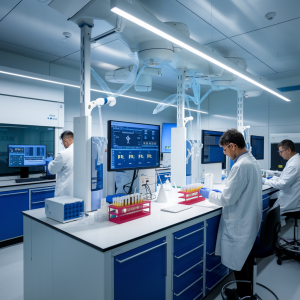In recent years, scientists have discovered a remarkable relationship between our gut microbiome and overall health. In particular, recent findings point to the crucial role these microorganisms play in reducing cancer risk.
What is the Gut Microbiome?
The gut microbiome, or “gut flora,” refers to the millions of microorganisms living in our digestive system. It consists of bacteria, fungi, viruses, and other microbes that work together to maintain balance in our body.
The Link Between Gut Microbiome and Cancer
Recent research shows that gut microbiome plays a significant role in preventing and reducing cancer risk, especially colorectal cancer, through the following mechanisms:
- Boosting the Immune System: Certain microbes help stimulate the body’s immune system, enabling it to detect and eliminate cancer cells more effectively.
- Producing Antioxidants: Some microorganisms can produce antioxidants, which help prevent DNA damage that could lead to cancer.
- Controlling Inflammation: Beneficial microbes help reduce inflammation in the body, which is a key factor that increases cancer risk.
- Nutrient Transformation: Some microbes can convert nutrients into substances with anti-cancer properties, such as short-chain fatty acids.
How to Improve Gut Microbiome Health

Taking care of your gut microbiome is one way to reduce cancer risk. Here are some methods:
- Eat Fiber-Rich Foods: Vegetables, fruits, whole grains, and legumes are excellent foods for good gut bacteria.
- Increase Probiotic Foods: Fermented foods such as yogurt, kimchi, and pickled vegetables help increase the number of beneficial gut bacteria.
- Reduce Processed and Red Meat Consumption: These foods may negatively affect gut microbiome health and increase cancer risk.
- Exercise Regularly: Exercise is not only good for overall health but also helps increase gut microbiome diversity.
- Maintain a Healthy Weight: Being overweight or obese negatively affects gut microbiome health and increases cancer risk.
- Reduce Stress: Stress negatively impacts gut microbiome health. Meditation, yoga, or other relaxation activities can help.
- Avoid Unnecessary Antibiotic Use: Antibiotics can destroy good gut bacteria. They should only be used when necessary and under medical supervision.
Taking care of your gut microbiome not only helps reduce cancer risk but also benefits overall body health. Small lifestyle changes can have a tremendous positive impact on long-term health. So, let’s start taking care of your gut microbiome army today for better health and reduced cancer risk!
If you have questions about cancer prevention or treatment, you can consult with a cancer specialist to receive appropriate advice and the best care at https://bitly.cx/RFLU
#Cancer #AntiAging #epigeneticthailand.com #ConsultWithOncologist #AntiAging



